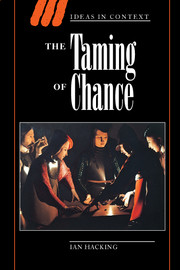Book contents
- Frontmatter
- Contents
- Acknowledgements
- 1 The argument
- 2 The doctrine of necessity
- 3 Public amateurs, secret bureaucrats
- 4 Bureaux
- 5 The sweet despotism of reason
- 6 The quantum of sickness
- 7 The granary of science
- 8 Suicide is a kind of madness
- 9 The experimental basis of the philosophy of legislation
- 10 Facts without authenticity, without detail, without control, and without value
- 11 By what majority?
- 12 The law of large numbers
- 13 Regimental chests
- 14 Society prepares the crimes
- 15 The astronomical conception of society
- 16 The mineralogical conception of society
- 17 The most ancient nobility
- 18 Cassirer's thesis
- 19 The normal state
- 20 As real as cosmic forces
- 21 The autonomy of statistical law
- 22 A chapter from Prussian statistics
- 23 A universe of chance
- Notes
- Index
- Ideas in Context
10 - Facts without authenticity, without detail, without control, and without value
Published online by Cambridge University Press: 05 June 2014
- Frontmatter
- Contents
- Acknowledgements
- 1 The argument
- 2 The doctrine of necessity
- 3 Public amateurs, secret bureaucrats
- 4 Bureaux
- 5 The sweet despotism of reason
- 6 The quantum of sickness
- 7 The granary of science
- 8 Suicide is a kind of madness
- 9 The experimental basis of the philosophy of legislation
- 10 Facts without authenticity, without detail, without control, and without value
- 11 By what majority?
- 12 The law of large numbers
- 13 Regimental chests
- 14 Society prepares the crimes
- 15 The astronomical conception of society
- 16 The mineralogical conception of society
- 17 The most ancient nobility
- 18 Cassirer's thesis
- 19 The normal state
- 20 As real as cosmic forces
- 21 The autonomy of statistical law
- 22 A chapter from Prussian statistics
- 23 A universe of chance
- Notes
- Index
- Ideas in Context
Summary
Paris, 5 October 1835 In statistical affairs … the first care before all else is to lose sight of the man taken in isolation in order to consider him only as a fraction of the species. It is necessary to strip him of his individuality to arrive at the elimination of all accidental effects that individuality can introduce into the question.
Numbers were a fetish, numbers for their own sake. What could be done with them? They were supposed to be a guide to legislation. There was the nascent idea of statistical law, but hardly any statistical inference. Yes, one could conclude that the French are more prone to suicide than the English. Yes, Guerry could invent (almost without knowing it) rank-order statistics to argue that improved education does not counter crime rate. But hardly anyone sensed that a new style of reasoning was in the making.
Medicine is a good example. The statistics of Paris were full of tables reporting the great hospitals. Would not these batteries of numbers lead at once to tests of treatment and cures? Not at all. When the numbers were used, it was more out of professional jealousy than in a quest for objective knowledge.
The first use of statistical data to evaluate treatment was, it appears, in connection with the charismatic and polemical F.-J.-V. Broussais, whose belief in a ‘stay-alive’ organ I mentioned briefly in chapter 8. He will figure in chapter 19 because of the way that Comte transferred his physiological conception of the ‘normal state’ to society and politics.
Information
- Type
- Chapter
- Information
- The Taming of Chance , pp. 81 - 86Publisher: Cambridge University PressPrint publication year: 1990
